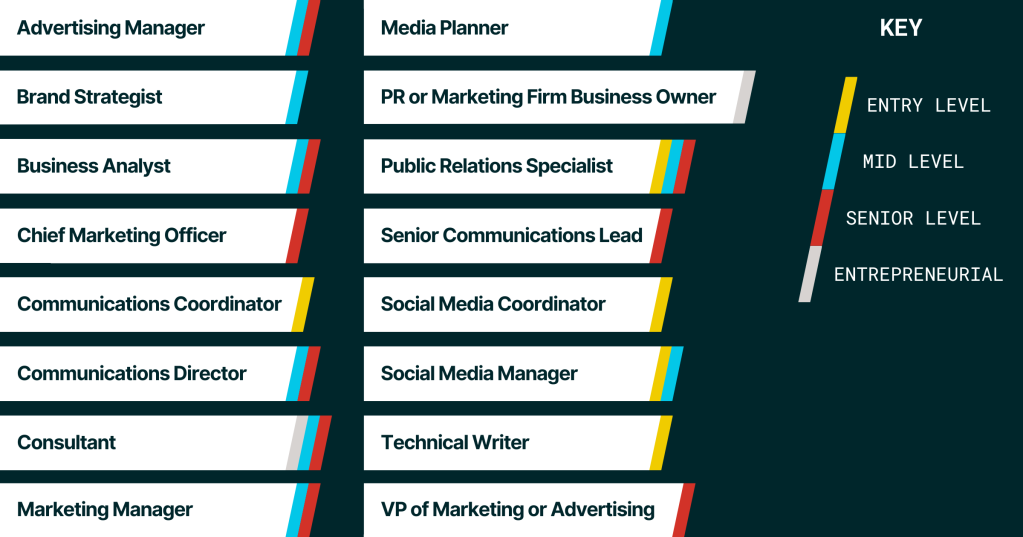The way we communicate constantly evolves because every breakthrough changes the way we deliver and consume news, advertising, and content. That means communications professionals need to evolve, too. Tomorrow’s creative leaders will need knowledge and expertise across multiple fields. Learning communications skills prepares you to think critically while identifying and analyzing opportunities; envisioning, proposing, and implementing solutions; and adapting to change and uncertainty.
Not convinced yet? Here are a few data points to give you an idea of what the communications industry offers and where it’s heading.

Let’s review this skill set together by discussing how communications expertise can be acquired, applied, and transformed into a fulfilling career.
What do communications professionals do?
The responsibilities of communications professionals can vary, but they all revolve around creating and delivering effective communications to others within or outside their organizations. Here are some common responsibilities found in the job descriptions of communications professionals:
Create brand identity and awareness — Design branded content, develop social media strategy and content, and collaborate with design and graphics teams to create a cohesive brand identity.
Develop media strategy — Develop social media content and strategy, monitor activity trends, evaluate strategies for organizations and clients, and analyze data to inform tactics and plan future marketing.
Manage client relations — Build client relationships, optimize media plans, oversee media relations, design digital marketing plans, and manage projects.
To know where your skill set fits within the industry, sometimes all it takes is a little research. Listen as Ruben A. Ruvalcaba, B2B associate marketing manager at Zoetis, shares his experiences applying course knowledge to the job search:

It was heavy, it was heavy, it was packed with a lot of information. But I’ve learned a lot for sure. The things that I really loved the most about [it] was the strategy behind all the paid media and SEO. That creative, that is [strategic] thinking, other research, the data analysis, I really loved that part, and, well and then I started to look for jobs related to this, to professionalize this course a little bit further.
Discover your career opportunities
Acquiring basic communications skills opens up a wide range of career opportunities around the world.

Expert advice
“Start with your “why” – why you are pursuing the field or the types of roles that you are looking for. Use that as a theme for your brand. Then think about how your strengths and values relate to your why…Do you have really strong communication skills?…Relate your strengths to your why and that will help you identify your brand!”
— Deanna Parkton, career expert at edX

How can I acquire communications skills and turn them into a career?
If you’re interested in pursuing your own career in the communications industry, we recommend taking these steps:
Research is key in any career, and a career in communications is certainly no exception. Take advantage of all the information out there, whether through surfing the internet for job titles, listening to industry-specific podcasts, or getting connected to professionals in the areas or positions that interest you.
Pro tip:
Explore your career possibilities. As part of your research, take every opportunity to learn more about topics in your desired field. Browse the edX course catalog at edx.org to see what communications-related topics, courses, and programs interest you and start advancing your career in communications today.
One key part of the research phase is networking. This simple step is often overlooked and undervalued but can significantly impact your career trajectory. To clarify your career goals and aspirations, you should talk with professionals about what working in communications looks like.
You open a door of opportunity in your own career by reaching out to professionals in your targeted fields, positions, and companies. Connecting with communications professionals who could help you gain hard-to-find intel about the industry is invaluable.
Pro tip:
We highly recommend scheduling Behavioral Interview Prep Guide to learn and connect with communications professionals and hiring managers to gather information. These people can help you learn new skills, offer advice, and share job opportunities.
Check out our Networking Guide and Outreach Templates and Resources for help getting started.
To supplement your understanding of what others are doing professionally, make sure to determine your own goals and aspirations. Ask yourself if the communications industry itself is what interests you or if its the communications functions within another industry. The possibilities are endless!
Communication skills are valuable across the vast majority of professional industries. Of course, specific skills within the communications industry will increase the value you can add to a job and increase the pool of job postings you qualify for.
Use the list below to determine which popular skills match your interests.
Technical writing — Journalism, brand management, content development.
Social media — Online marketing, brand management, content strategy, data analysis, forecasting.
Public relations — Client relationship management, brand content strategy and development, digital marketing, project management.
Marketing — Advertising, market analysis, content strategy and development, digital marketing, project management.
Pro tip:
Another way to identify which skills match your career aspirations is to look at job postings that interest you. Take note of the skills and technologies listed in the descriptions. These are the skills that will qualify you for these roles in the future.
There are a variety of mediums through which you can learn coding skills. Consider which route best fits your needs and learning-style. Here are a few options to consider:
There are a variety of mediums through which you can learn communications skills. Consider which route best fits your needs and learning style. Here are a few options to consider:
Self-education — If you want to learn asynchronously, informally, or casually, self-education is a great place to start. Many approaches to this learning style support various career goals, budgets, learning styles, and time commitments. Here are some ways to self-educate in communications:
- Informal opportunities: Gain a greater understanding of the industry by reading. Explore books and articles to expand your communications knowledge and learn what’s happened or is happening in the field. Not a reader? Plenty of videos, podcasts, and other forms of multimedia can teach you a thing or two about careers related to communications.
- Online Courses: If you prefer a more structured or socialized learning experience, online courses might be a good option. edX.org offers several instructor-led and self-paced communications courses that may be of interest.
- Professional certifications: When you want a less casual learning experience but don’t have needs that warrant a boot camp or degree, professional certifications may be the best fit for you. Professional certifications are a great addition to your resume and build your skills for roles in communications. edX.org offers many certificate programs that may interest you.
Communications degree — Pursuing a degree in communications means diving deep into the fascinating world of media, marketing, and business! It’s an excellent choice if you want to gain a comprehensive understanding of writing, marketing, multimedia, and storytelling that have contributed to shaping the way we communicate today.
Employers hiring for a communications role may require a portfolio of projects, such as personal or professional projects or writing samples. You’ll want to build a competitive online portfolio highlighting your skills and unique value.
Helpful resources:
The career team at edX has resources and workshops to help you fine-tune your application materials and prepare for interviews. Start with the Brand Statement Guide, and LinkedIn Guide since professional branding is a communications professional’s cornerstone.
Once you begin working in the communications industry, make sure to celebrate your success. The career journey is full of ups and downs, and each victory deserves acknowledgment.
With that said, your journey doesn’t end here — it’s only just beginning. Give yourself grace and understand that careers are not linear. Here are some of the ways you can keep growing within the communications industry:
Continued learning — Always reference our course catalog on edX.org for continued learning opportunities. Now that you’ve secured a career in communications, it never hurts to brush up on your skills, expand your knowledge, or discover other subjects that could apply to your work, interests, or something in between.
Promotions — Career advancement in communications can be varied, just like the industry. Depending on which type of communications track you work in, you may become a public relations director, a business strategist, a people manager, or even start your own marketing firm.
Pivots — Make sure to regularly check in with yourself and your satisfaction with daily tasks. If you are dissatisfied in your current role, take stock of what you like and dislike about it, keep your eyes out for company-sponsored growth opportunities, and pursue career pivots that optimize your background, skill set, and interests.
What could my career look like with a communications skill set?
It is difficult to say exactly what your life would look like as a communications professional, but we do have some metrics about the realities of the industry. Consider how these may factor into your life plan:
Flexible workplace culture — According to Worklife (2022), a study into a hybrid working model at a media company that involves working remotely and Friday afternoons off has boosted productivity by 56%. Media and marketing companies are noted for having embraced hybrid and flexible models in recent years, in part due to the growing digital nature of the work. According to Avuity (2023),Companies like Google, Meta, Airbnb, and Slack that employ communications professionals have all opted to enact flexible workplace models since 2020.
Wide range of options — Startups, medium-sized, and large-sized companies all need communications professionals. As a communications professional, you can find the right fit for you. And don’t forget that you can freelance or become an entrepreneur!
Competitive salaries — Per the U.S. Bureau of Labor and Statistics (2023), Communications professionals are in demand, and their salaries reflect this. Check it out for yourself by researching salaries in your region.
Real life as a communications professional
“What seemed to work for me was getting into a small agency that was growing. So they were hiring a lot of different positions. I got to come in and experience the industry very broadly, try on a lot of different hats, work with a lot of different teams…you start there and then you find the things you wanna hone in on and then you can start paring down your resume and focusing on those specialties.”
– Miller Murray, assistant client success manager

What are my next steps?
Learn about topics in communications:
Register for a course on edX to learn about a variety of topics within the communications industry, such as Professional Communication: Business Writing and Storytelling or Business Communications.
Watch a session:
Watch a relevant session on our Events page to learn more about the industry and other professionals’ experiences within it.




